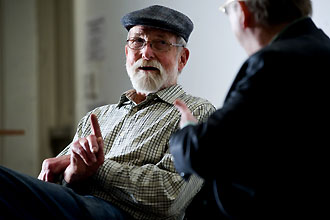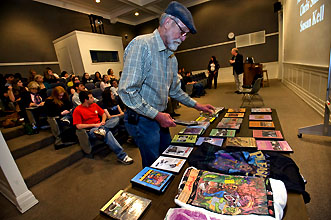Les Blank Captures Life on Film
On a recent trip to New Orleans, Les Blank's every move was followed by a small film crew. Usually behind a camera instead of in front of one, the prize-winning independent documentary filmmaker is now himself the subject of a feature-length documentary. The film crew trailed Blank, a Tulane alumnus, as he lectured on campus.

Filmmaker Les Blank speaks to students and faculty in the Woldenberg Art Center during a recent campus visit. (Photos by Paula Burch-Celentano)
"How many of you have seen anything I made?" Blank shyly asked the group assembled in the Stone Auditorium on March 22 before showing a clip from his film Gap-toothed Women. Blank seemed delighted when a large number of hands shot up.
Nick Spitzer, Tulane professor of anthropology and American studies and creator and producer of the radio show "American Routes," led a question-and-answer period in which students and faculty asked Blank about his raconteur's approach to capturing on film musicians and other folkloric subjects. "Les is more," Spitzer quipped.
Music plays an integral part in Blank's films. Of all his films, he said, his favorite is the one about Lightnin' Hopkins, a Texas blues singer.

"I distribute my own films," says Blank, spreading out an assortment of DVDs and T-shirts on a table.
"I struggled with that film for about a year, then I thought I'd do the film like a piece of music," Blank said. "What I want to say seeps up to the surface somehow. Music can carry a film. I try to get music that resonates deep within me."
Blank, who holds a bachelor's degree in English literature (1958) and a master of fine arts in theater (1960) from Tulane, said the material of his films often takes him in unexpected directions.
"I don't have enough imagination to conjecture a film from beginning to end," he said. When doing a documentary, "you have to see where it takes you."
For example, he said, "I did a film on drag racing, and the subject crashed, burned and nearly died. It helped the film a lot."
During his trip to New Orleans, Blank also was honored at the Ogden Museum of Southern Art with a retrospective tribute to his work.
